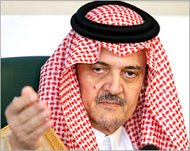Monday, February 27, 2006
Psoriasis Drug May Also Clear Up Depression and Fatigue.
In a double-blind placebo-controlled phase III trial, 55% of patients taking Enbrel had significant reductions from baseline in symptoms of depression after 12 weeks of therapy, found Stephen Tyring, M.D., of the University of Texas Health Science Center here, and colleagues.
This compared with 39% of patients taking a placebo, they reported in a study published online today by The Lancet.
Enbrel is approved by the FDA for treating symptoms of psoriasis as well as psoriatic arthritis, rheumatoid arthritis, and ankylosing spondylitis. Depression and fatigue are common among psoriasis patients, the researchers noted, and are probably due in part to the altered appearance of the skin and by joint pain in those who also have psoriatic arthritis. . [MED PAGE TODAY]
300,000 Young Couples Suffer From Infertility.
“According to the Department of Statistics, our birth rate dipped to 19.6 babies per 1,000 persons last year, compared with more than 20 babies per 1,000 the previous year,” Chua said, adding that the World Health Organisation reported in 2002 that infertility affected 80 million people worldwide.
The demand for fertility services in Malaysia would grow as there were now only three public and 20 private centres offering test-tube baby services. [NST]
Islam Prohibits Backbiting.

A commentary by Sheikh Yusuf Al-Qaradawi.
In the Name of Allah, The Most Gracious, Most Merciful.
All praise and thanks are due to Allah, and peace and blessings be upon His Messenger.
Allah s.w.t says:
“Islam prohibits backbiting [ghibah]: 'And do not backbite one another.'
[Al-Hujurat: 12]
What Constitutes Backbiting?
[i.] The Prophet s.a.w wanted to stress the meaning of backbiting to his Companions and he asked them, 'Do you know what backbiting is?' They replied, 'Allah and His Messenger know best'.
And The Prophet said: 'It is saying something about your brother which he would dislike'. Someone asked, 'What if I say something about my brother which is true?' The Prophet s.a.w replied: 'If what you say of him is true, it is backbiting and if it is not true you have slandered him.' [Reported by Muslim, Abu Dawud, At-Tirmidzi, and An-Nasa’i]
[ii.] When a person dislikes someone, he is likely to find faults in his appearance, behavior, lineage, and anything else, which pertains to him or her. In a case, `A’ishah narrated that she said to the Prophet s.a.w:
'Do you see that Safiyyah [another wife of the Prophet] is such and such?’ meaning that she was short.
The Prophet s.a.w replied: 'You have spoken a word such that, if it were mixed in the water of the ocean, it would darken it.' [Reported by Abu Dawud, At-Tirmidzi, and Al-Bayhaqi]
[iii.] Backbiting is nothing but a desire to belittle people, to slander their honor, and to deride their accomplishments in their absence. Since this is stabbing in the back, it is an expression of narrow-mindedness and cowardice.
Backbiting is a negative trait, and only those engage in it who themselves are not achievers. It is a tool of destruction, for one who is addicted to it leaves no one without throwing a dart at him and wounding him.
The Qur'an paints such a repulsive picture of this vile habit as would make people shrink from it in horror: 'And do not backbite one anther; would any of you like to eat the flesh of his dead brother? You would abhor that.'
[Al-Hujurat: 12]
Since one feels sick at the very thought of eating human flesh, how much more revolting it is to think of eating the flesh of one's dead brother?
Whenever an opportunity arose, the Prophet s.a.w stressed this Qur’anic imagery in order to imprint it on peoples’ hearts and minds.
Ibn Mas`ud narrated, 'We were sitting with the Prophet s.a.w. Then a man got up and left. Whereupon another person spoke ill of him. The Prophet s.a.w told him, 'Pick your teeth.' The man replied, 'Why? I haven't eaten any meat.' The Prophet s.a.w replied: 'You have eaten your brother's flesh.' [Reported by At-Tabarani]
Jabir narrated, 'While we were with the Prophet s.a.w the wind brought a foul odor in our direction, whereupon the Prophet s.a.w said, 'Do you know what this odor is? It is the odor of those who backbite the Believer[Reported by Ahmad]
The Exceptions.
All these textual quotations demonstrate the sanctity and dignity, which is accorded to Man in Islam. However, scholars have listed some exceptions, necessarily limited to certain circumstances, when talking about a person in his absence is permitted. Among these exceptions is the instance of a person who has been wronged and who complains about the wrongdoer. While he must then speak about what the other dislikes, it is his right to do so in order to secure justice; consequently, he is given permission to describe the wrong he has suffered.
Allah the Almighty says: 'Allah does not like the announcing of evil in public speech except by one who has been wronged; and Allah is Hearing, Knowing.' [An-Nisa': 148)]
If someone wants to investigate the character or suitability of a person with whom he wants to enter into partnership, who has asked for his daughter in marriage, or who is seeking employment with him, it is permissible for those who have been asked to give their frank and honest opinion. Here there is a conflict between two obligations: one, to give good advice to the person who seeks the information, and two, to protect the honor of the person about whom the opinion is sought.
But, the first obligation takes precedence over the second, as it is more important and more sacred.
Fatimah bint Qays asked the Prophet s.a.w about two men who had asked for her hand in marriage. The Prophet s.a.w told her about one of them, 'He is good for nothing and has no property,' and about the other, 'He does not put his stick down from his shoulder,' meaning that he frequently beats the women of his household.
It is also permissible to speak about a person without his knowledge if a legal opinion or religious ruling is required concerning him or if help is needed to combat some evil he may be causing, or to refer to him by a name, title, or characteristic which he dislikes but without which he cannot be identified, as for example, 'the lame person' or 'the person with one eye.' Likewise, cross-questioning a witness or criticizing the reporters of hadiths and news is permissible.
The general rule concerning the permissibility of speaking about someone in his absence is governed by two considerations: [1.] the need and [2.] the intention.
[1.] When there is no compelling need to mention the third person in a manner in which he would dislike, one must refrain from violating the sanctity of his personality and honor. If there is a need to mention him but the need can be met by an indirect reference, one must not be explicit. If a general discussion is sufficient, the mentioning of specific persons must be avoided. For example, in seeking a juristic opinion, one can phrase the question as, 'What would your opinion be if someone did such and such a thing?' rather than, 'This person is doing such and such. What do you think about it?' Again, if one must identify the person, he must mention only what is true, since ascribing anything false to him is prohibited.
[2.] In any event, the intention is the decisive factor. The speaker knows his own motives better than anyone else does —whether it constitutes a genuine complaint against wrongdoing or mere spite, an inquiry concerning an issue or a slander, a scholarly criticism or envious backbiting, piece of good advice or the spreading of a rumor. It is said in this connection that the Believer is a sterner judge of himself than a tyrannical ruler or a greedy partner could be.
Islam has decreed that the listener is the partner of the one who is absent, and he must defend his absent brother by repudiating the slander being spoken.
The Prophet s.a.w said, 'If anyone defends his brother who is slandered in his absence, it will be [his] due from Allah to set him free from the Fire.' [Reported by Ahmad]
Again, 'If anyone defends his brother’s honor in this world, Allah will shield his face from the Fire on the Day of Resurrection.' [Reported by At-Tirmidzi]
If a person does not have the courage to speak out in defense of his brother against malicious tongues, the least he can do is to withdraw from such company until they turn to some other topic; otherwise, what would apply as the Qur’an says that 'Truly, you would then be like them." [An-Nisa': 140]
Thus, May Allah guide and always keep us all firm in the straight Path!
Dato Onn Jaafar.
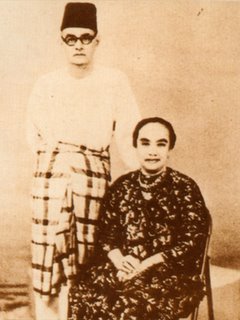 Dato Onn Jaafar was born in 1895 at Bukit Gambir, Johor Bahru. His father Dato Jaafar Haji Muhammad [1838? 1919] was the first Menteri Besar of Johor while his mother, Hanim Rogayah was from Scarcia, Turkey.
Dato Onn Jaafar was born in 1895 at Bukit Gambir, Johor Bahru. His father Dato Jaafar Haji Muhammad [1838? 1919] was the first Menteri Besar of Johor while his mother, Hanim Rogayah was from Scarcia, Turkey.He was sent to England to study by Sultan Ibrahim of Johor and was the best student in English and French. Upon his return from England, he was sent by his father to study Bahasa Melayu in the Malay College Kuala Kangsar.
He held many jobs and among them being the editor of Warta Ahad, which indirectly led him to be involved in politics and the struggle for Malays.
When he was a member of the Majlis Mesyuarat Negeri Johor, he made two important political contributions to the people of Johor, that is, the setting up of the Sultan Ibrahim Scholarship and issuance of free airfares to perform the pilgrimage in Mecca for Islamic officers serving the Johor government.
The establishment of the Malayan Union in 1946 by the British was greatly opposed by the Malays as it took away the ruling powers of the Sultan and the special rights of the Malays. Dato Onn then held an All - Malaya Malay Congress [Kongres Melayu Sa-Malaya] to unite the Malays in order to oppose the Malayan Union.
The Congress was held from the 1st till the 3rd of March 1946 and it was attended by 41 Malay Associations. Among the decisions taken by the Congress were to boycott the Malayan Union, to mourn for seven days and to wear a white banner on their songkok [headgear].
Dato Onn then initiated the setting up of UMNO [United Malays National Organization] on 4th March 1946 to unite the Malays in order to oppose the Malayan Union.
He was appointed the President of UMNO and suggested that UMNO be opened to other races in Malaya in order to resolve the racial issue in politics. However, his suggestion was greatly opposed by the Malays. Dato Onn resigned as President in 1951.
Besides being the founder of UMNO, he was also responsible for the social economic welfare of the Malays by setting up Rural Industrial Development Authority [RIDA].
Although he failed to win in the General Election in 1955 to become the first Prime Minister of Malaya, he had played an important role in paving the way for Malaya to achieve independence on 31st August 1957. He died in 1962 at the age of 67.
Sunday, February 26, 2006
Honouring the Struggle of Datuk Onn Jaafar.
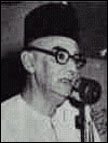 In an effort to revitalize the party, Umno organize an event, called Memperingati perjuangan Datuk Onn: Pengasas negara sebuah bangsa [In memory of the struggles of Datuk Onn: Founder of a country and people], will be held at Batu Pahat stadium.
In an effort to revitalize the party, Umno organize an event, called Memperingati perjuangan Datuk Onn: Pengasas negara sebuah bangsa [In memory of the struggles of Datuk Onn: Founder of a country and people], will be held at Batu Pahat stadium.More than 15,000 people attended the event to commemorate the struggles and sacrifices of Umno founder Datuk Onn Jaafar on Sunday Feb 26, 2006. Prime Minister Datuk Seri Abdullah Ahmad Badawi and other Umno leaders took part in a 1km march to the stadium as part of the event.
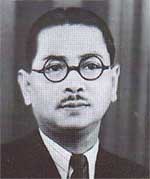 The organizing committee chairperson Senator Dr Mohd Puad Zarkashi said it was a re-enactment of the march led by Onn 60 years ago. On Feb 10, 1946, Onn led a group of 15,000 people in a march to oppose the setting up of the Malayan Union.
The organizing committee chairperson Senator Dr Mohd Puad Zarkashi said it was a re-enactment of the march led by Onn 60 years ago. On Feb 10, 1946, Onn led a group of 15,000 people in a march to oppose the setting up of the Malayan Union.He said, “We have lined up an array of activities for the whole year,”
Other events were an international seminar on Onn, musical performances, exhibitions, competitions for students, and an expedition called Kembara Datuk Onn. “Kembara Datuk Onn will take us to the eight places around the country where he spoke to people to oppose the Malayan Union,” he said.
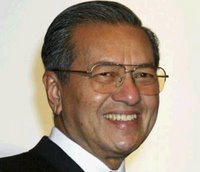
Meanwhile, Pak Lah said at launching Putera Umno at Taman Brown, Jalan Datuk Keramat, Penang Saturday Feb 25, 2006 that the new generation of Umno leaders must be stronger than the present one to ensure they are fit to lead Barisan Nasional. “Our previous four leaders, from Tunku Abdul Rahman to Tun Dr Mahathir Mohamad, were all great leaders. “We must take them as examples,”
He said Umno must continue to produce committed, dedicated and disciplined leaders to ensure continuity in implementing the party’s agenda from one generation to another. “We have no choice. The young generation must know the value of our struggle,” he said, adding that Umno’s struggle would die off if there were no continuity in leadership.
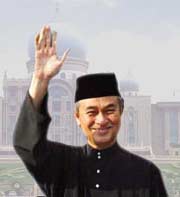
Abdullah also said they must grow stronger to secure continuous survival. They need the right guidance. They must also have the determination [to be good leaders]. “All of you have to be better than us [current leaders],” he added.
It is sensible. Patah tumbuh hilang berganti.
Hamas lists Terms for Recognising Israel.
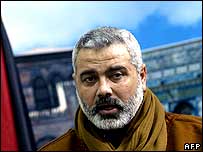 The Palestinian prime minister-designate Esmail Haniya said Hamas is "ready to recognise" Israel if it gives the Palestinian people their full rights and a state in lands occupied since 1967, including the West Bank and East Jerusalem.
The Palestinian prime minister-designate Esmail Haniya said Hamas is "ready to recognise" Israel if it gives the Palestinian people their full rights and a state in lands occupied since 1967, including the West Bank and East Jerusalem.Esmail Haniya, a 43-year-old Gazan viewed by many Palestinians as a pragmatist, as the new prime minister after sweeping the elections on January 25. Hamas hopes to complete forming a Palestinian government within two weeks. "If Israel declares that it will give the Palestinian people a state and give them back all their rights, then we are ready to recognise them," Haniya said.
Haniya also said Hamas, was ready to consider talks with Israel if the Jewish state withdrew from the West Bank and East Jerusalem and recognized the "right of return" for Palestinian refugees who fled in the 1948 war and their descendants. "If Israel withdraws to the 1967 borders, then we will establish a peace in stages," Haniya said. "We will establish a situation of stability and calm, which will bring safety for our people."
Israel, meanwhile, has already rejected the conditions Haniya imposed for such a peace, namely, ceding the entire West Bank and east Jerusalem, and allowing Palestinian refugees the right to return to Israel, where they could eventually outnumber Jews.
Haniya said: "We will review all agreements and abide by those that are in the interest of the Palestinian people." "The ones that will guarantee the establishment of a Palestinian state with Jerusalem as its capital with 1967 borders."
"We do not have any feelings of animosity toward Jews. We do not wish to throw them into the sea. All we seek is to be given our land back, not to harm anybody," he added. "We are not interested in a vicious cycle of violence," he added. "If peace brings us our rights, then this is good."
Saturday, February 25, 2006
US’ Rejection of Dubai Ports Deal was Racist, Flawed.

President George W. Bush reiterated on Friday Feb 23 that his administration would not reconsider its approval for a United Arab Emirates company to manage six U.S. ports, a deal described by Thomas Kean, former Republican governor of New Jersey who led the bipartisan probe of the Sept. 11 attacks, as "never should have happened."
The uproar sparked by the deal involving selling six domestic shipping operations to a United Arab Emirates-owned company continues with opponents, including the agency that runs New York and New Jersey ports, taking the case to the court, and the company, Dubai Ports World, intensifying efforts to change the minds of congressional critics.
Lawmakers, both Republican and Democrats have pledged to scupper the deal, claiming that their opposition is mainly tied to the fear that Arab management of the ports will lead to “terror” attacks.
However, an editorial on The Daily Star says, “this logic is at best flawed, and at worst racist.”
The deal's opponent claim that Dubai Ports World is owned by a foreign government whose nationals were involved in September 11 attacks on the U.S., but nobody cited similar concern when the ports were under the management of a British firm, despite the fact that some “terrorists” have also carried British passports- No concerns were ever raised about the UK involvement in the U.S. ports, although the British Army once burned Washington. [ Aljazeera]
Malaysia Needs More Dentists.

This is an intresting piece of report !!
Director-General of Health Datuk Mohamed Ismail Merican said on Saturday Feb 24 [Bernama report] that Malaysia would still face a shortage of dentists by 2020. The dentist population ratio in Malaysia, which stood at 1:9,560 last year, was still far from the projected 1:4,000 for the year 2020.
In spite of three public dental schools, which are University of Malaya, Universiti Kebangsaan Malaysia and Universiti Sains Malaysia, supplying dentists for the country, we are still short of the country's target. Merican said in his speech at the 13th FDI-MDA Scientific Convention and Trade Exhibition organised in Kuala Lumpur.
Police to Probe Blogger Jeff Ooi.

NST says Jeff Ooi, owner of Internet blog Screenshots, has come under police scrutiny for allegedly inciting racial disharmony over a cartoon strip published in the New Straits Times.
This follows a report lodged at Brickfields police station on Tuesday. It is the second investigation on Ooi since his blog came online.
In October 2004, a Net surfer "Anwar" posted a message on Screenshots, which contained profanities.
Ooi removed the post and blocked the anonymous "Anwar" from the site, but it was too late, as many angry readers had already read the post.
Energy, Water and Communications Minister Datuk Seri Dr Lim Keng Yaik then directed an official investigation. The matter was later forwarded to the deputy public prosecutor.
Sri Kandeh says Malaysia needs nation builders. It has been too long we have suffered and colonized for 440 years by foreign powers.
Every single Malaysian must remember that only recently, we gained and learned how to manage our affairs ! And manage it well.
Action If Prophet's Caricatures Posted On the Internet.
 Action will be taken under the Multimedia and Communications Act against anyone found to have posted or distributed the offensive cartoons of Prophet Muhammad, Deputy Minister of Energy, Water and Communications Datuk Shaziman Abu Mansor warned on Friday Feb 24.
Action will be taken under the Multimedia and Communications Act against anyone found to have posted or distributed the offensive cartoons of Prophet Muhammad, Deputy Minister of Energy, Water and Communications Datuk Shaziman Abu Mansor warned on Friday Feb 24.He said provisions in the Act were clear against anyone found to have posted or distributed materials containing pornographic elements, humiliating, degrading or damaging the reputation of any party was liable to a maximum fine of RM50, 000 or jailed for not less than a year, or both, upon conviction.
"If they're convicted and they're found to have repeated the offence, they will be fined RM1, 000 a day for posting or distributing through the Internet," he said.
He said this when asked to comment on public concerns over posting and distributing of the controversial caricatures on the Internet that could be a subject of poking fun and ridicule by some people.
Stressing that the ministry was monitoring the matter, Shaziman said the people could co-operate by lodging complaints to the Multimedia and Communications Commission so that the ministry could detect the source that posted or distributed the caricatures. [Bernama]
Friday, February 24, 2006
The Qualities A Person Should Develop.

Some people think that if one succeeds in observing solat [prayer], sawm [fasting], zakat [payment of a certain portion of one’s wealth to the poor] and Hajj [pilgrimage to Makkah], and then that person is a perfect Muslim. This indeed is not the case. If observing rituals does not help us to be humble, virtuous and truly God-fearing, then we are not real Muslims.
The qualities a person should develop in him or herself are mentioned in the Qur’an and hadith repetitively.
Allah s.w.t says: Those who humble themselves in their prayers; who avoid vain talk; who are active in deeds of charity, who abstain from sex except with those joined to them in marriage or [the captives] whom their right hands possess, for [in their case] they are free from blame. However, those whose desires exceed those limits are transgressors. Those who faithfully observe their trusts and their covenants; who [strictly] guard their prayers: these will be the heirs who will inherit Paradise, to dwell therein.
[Al Mu’minun 23, verses 1 to 11]
Prophet Muhammad s.a.w said: None of you truly a believer until he loves for his brother as he loves for himself.
He also said: "By Allah! He does not believe. By Allah! He does not believe. By Allah! He does not believe."
He was asked: “Who, O Messenger of Allah?”
Then he said: "Whoever does not safeguard his neighbor from his harms."
We can summarize the teachings of Islam about the Muslim character concisely in the following:
Be truthful; do not be dishonest.
Be humble; do not be arrogant.
Be moderate; do not be excessive.
Be clean; do not be corrupt.
Be reserved; do not be garrulous.
Do not be boastful; be soft-spoken.
Do not be unmindful of others; be loving and solicitous to them.
Do not be harsh; be considerate and compassionate.
Do not be insulting and disrespectful to people; be polite and helpful.
Do not be selfish and miserly; be generous and charitable.
Do not swear, do not curse; be refined and gentle in speech.
Do not be bitter and resentful; be cheerful and magnanimous.
Do not be greedy; be content, be grateful for what one has.
Do not be irritable and morose; be cheerful and pleasant.
Do not be lustful; be chaste and pure.
Do not be absent-minded; be alert.
Do not be graceless; be dignified and decent.
Do not be hypocritical; be sincere and straightforward.
Do not be cynical or pessimistic; be optimistic and hopeful.
Do not be doubtful and wavering; be confident and deep in faith.
Do not be materialistic; be spiritually oriented.
Do not lose heart or be desperate; always have faith in Allah’s mercy.
Do not be negligent to your duties; be diligent and vigilant. Do not insult and disrespect your parents; be kind and helpful to them.
Do not be forgetful of the innumerable blessings of God; be thankful to Him and constantly pray to Him: All praise is to Allah, the Lord of the world.
Costello told anti-secularism Muslims to leave Australia.

Australian Treasurer Peter Costello said that Muslims who want to live by Islamic syari’ah law were not welcome in the country, fuelling more anger after Prime Minister John Howard's comments on "extremist" Muslim immigrants.
Ameer Ali, president of the Australian Federation of Islamic Councils, said that he agreed with Costello that people who do not want to accept Australian values should not live in the country.
But he said Costello was "ignorant" when he talked about Syari`ah.
"There are already Syari`ah laws in this country because the majority of Australian laws have no contradiction with the Syari`ah laws," Ali said.
"The government is gradually setting the stage to back away from its commitment to multiculturalism and go back to the days of the white Australian policy. That seems to be the ulterior motive behind all these attacks."
PM Accepts Apology, No Action against NST.
However, Abdullah also said he was waiting for details about RTM's Feb 3 airing of a group of people viewing the banned Danish cartoons.
In the apology, New Straits Times said it had "misjudged how different people would react to Wiley Miller's Non Sequitur syndicated cartoon" published on Monday. The newspaper said it "never intended to hurt any feelings. "But we stand corrected. We should have been more sensitive — human error or not. So again, we apologise."
The apology was also stated in the newspaper's reply Thursday to the show-cause letter issued by the Internal Security Ministry on Wednesday.
Mladic: Serbia Did Not Know Where He Is.
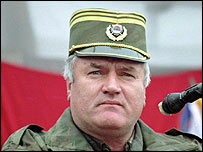
The Serbian government could capture top war crimes suspect General Ratko Mladic if it wanted to do so, the UN's chief war crimes prosecutor Carla del Ponte said. Ponte said that Gen Mladic was within "immediate reach" of the Belgrade authorities.
Her comments came after a flurry of reports from Serbian media suggesting that the net was closing on Gen Mladic.
Gen MladicThe former Bosnian Serb commander has been indicted over the 1995 Srebrenica massacre. He is wanted in The Hague to face war crimes charges including genocide.
But Dutch Foreign Minister Bernard Bot, who visited Belgrade , said Serbian authorities had told him that Gen Mladic could be ill and trying to negotiate "with his own entourage" over a possible surrender.
However, the Serbian authorities did not know where he was, Bot said.
The Concept of Dress in Islam .
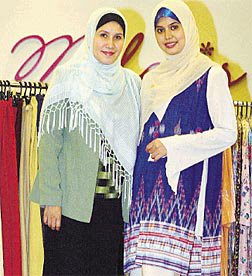 The rule for modesty applies to men as well as to women. The Prophet Muhammad s.a.w said that the first look is permissible. Consequent looks are forbidden. This means that one is not permitted to stare or to consume in vision the person before him or her.
The rule for modesty applies to men as well as to women. The Prophet Muhammad s.a.w said that the first look is permissible. Consequent looks are forbidden. This means that one is not permitted to stare or to consume in vision the person before him or her.The concept of dress in Islam also arises out of various verses stipulated in the Qur’an. These too reflect a state of moderation and modesty. It takes into account the created state of a woman in comparison to a man, thus the need not to attract undue attention to herself, which would naturally if she wore tight fitting or revealing apparel. This is intended to protect her and to give her honour and dignity.
However, it is a misconception to believe that Islam requires a person to be veiled or to go around totally in black.
The state of prayer which establishes the highest state of dignity in the presence of Allah s.w.t, allows for the face and hands to be uncovered.
Allah s.w.t says:
1. O Children of Adam! We have bestowed raiment upon you to cover your shame as well as to be adornment to you. But the raiment of righteousness – that is the best. Such are among the signs of Allah, that they may receive admonition!
2. O you Children of Adam! let not Satan [Syaitan] seduce you in the same manner as He got your Parents out of the garden, stripping them of their raiment, to expose their shame; for he and his tribe watch you from a position where you cannot see them; We made the Evil Ones friends [only] to those without faith. [Surah A’raf 7:26-27]
2. O Children of Adam! Wear your beautiful apparel at every time and place of prayer; eat and drink; but waste not by excess, for Allah s.w.t loves not the wasters. [Surah A’raf 7:31]
3. Allah s.w.t. will admit those who believe and work righteous deeds to gardens beneath which rivers flow; they shall be adorned therein with bracelets of gold and pearls; and their garments there will be of silk.
[Surah Hajj 22:23]
4. And tell the believing women to lower their gaze and be modest and to display of their ornaments only that which is apparent, and to draw their veils over their bosoms and not to display their beauty except to their husbands, their fathers, their husbands’ fathers, their sons, their husbands’s son , their brothers or theirs brothers’ sons, or their sisters’s son, or their women, or the slaves whom their right hands possess, or male servants free from physical needs, or small children who have no sense of the shame of sex; and that they should not strike their feet so as to reveal what is in their inner garments.[Surah Nur 24:31]
5. O you who believe, let those whom your right hands possess, and the [children] among you who have not come of age ask your permission [before they come to your presence] on three occasions; before morning prayer; while you put on clothes for the noonday heat; and after the late night prayer; these are your three times of undress; outside these times it is not wrong for you or for them to move about attending to each other…
[Surah Nur 25:58]
6. But when the children among you come of age, let them ask for permission, as do those senior to them [in age]… [Surah Nur 24:59]
7. Such elderly women as are past the prospect of marriage – there is not blame on them if they lay aside their [outer] garments, provided they make no a wanton display of their beauty; but it best for them to be modest; and Allah is One who sees and knows all things. [Surah Nur 24:60]
8. Upon them will be green garments of fine silk and heavy brocade. And they will be adorned with bracelets of silver; and their Lord will give them to drink of a wine, pure, and holy. [Surah Insan 76:21]
It is obvious that Muslim women are required to wear loose fitting garments. Except for the face and hands, all other parts are to be covered.
And Muslims are indeed required to dress well especially for prayers.
Thursday, February 23, 2006
US and Arabs Split Over Palestinian Aid.
Foreign Minister Prince Saud al-Faisal said that all aid to Palestinians should be based on the humanitarian needs. That contrasts with the US, which has said it will continue humanitarian aid but cut off assistance to a government led by a group it considers a terrorist organisation.
He said that the kingdom affirmed its complete commitment to avoid jumping to make prejudgments. Saudi Arabia hopes that international aid for the Palestinian people should be linked only with the pressing humanitarian need of this people. Stopping aid for a sewerage system infrastructure, which is the sort of project the US wants to be starved of funding, was effectively denying Palestinians humanitarian help, he added.
Saudi Arabia's rejection comes a day after Rice was similarly rebuffed by another Arab ally, Egypt, which is a key regional influence on positions toward the Palestinians even though it is not a large donor.
Both Saud and Ahmed Aboul Gheit, the Egyptian Foreign Minister, said the world should not prejudge Hamas, signalling that the Arab world, like some European countries and Russia, is hedging its bets about whether and when to sever financial ties that keep the cash-strapped Palestinian government afloat.
The Saudis told the US that they plan to continue sending approximately $15 million a month to the Palestinian government.
Rice heads to the United Arab Emirates on Thursday for a meeting with ministers from Gulf countries and was expected to hear the same.
The Palestinian government needs about $1.8 billion in aid each year and officials in the interim government say it is heading for a financial crisis.
Hamas has so far been unperturbed by pressure to change its anti-Israel stance and says threats to stop aid are blackmail.
The United States has sought to isolate Hamas since it won a parliamentary election last month.
It has won backing from most allies, including from Saudi Arabia and Egypt, to press the group to reverse its long-held doctrine and look for peace with Israel. However, despite hours-long meetings with regional leaders, Rice's Middle East tour has underscored the distance between the United States and its allies to press Hamas.
Israel froze the transfer of about $50 million in tax money it collects for the Palestinians each month, its first response to the inauguration of the new Hamas-led parliament Saturday Feb 18.
Malaysia Economy Grew 5.3% In 2005.

Malaysia's economy recorded an expansion of 5.3% last year, a slower growth from the previous year's annual gross domestic product [GDP] growth of 7.1%.
The Department of Statistics, which released the fourth-quarter 2005 gross domestic product [GDP] data, said value-added in the manufacturing sector recorded the highest growth of 7.3 per cent in the fourth quarter, surpassing that in the previous quarters.
The manufacturing sector posted a relatively high growth rate of 7.3% against 5.7%, 3.1% and 3.5% in the previous three quarters respectively. This was achieved in tandem with the rebound in the electrical and electronics [E&E] industry.
The services sector moderated to 6 per cent growth in the fourth quarter, after registering a strong growth of 7.3 per cent in the previous quarter. For the whole year, the services sector sustained its growth of 6.5 per cent, with the highest growth recorded by government services, followed by the wholesale and retail trade, and hotels and restaurants sub-sector.
The data was slightly below market expectations and a Business Times poll of economists, which expected the fourth quarter to grow at 5.6 per cent and 2005 to register 5.37 per cent growth.
The agriculture sector recorded negative growth of 1.1 per cent in the fourth quarter, attributed mainly to the decline in oil palm production by 6 per cent. The sector registered an increase of 2.1 per cent in real terms for 2005.
The construction sector which continued to contract by 0.6 per cent this quarter, showed a slight improvement although it shrank by 1.6 per cent for the whole year.
Mining declined in the fourth quarter by 2 per cent as the production of crude oil, condensate and natural gas registered negative growth, lending the sector a 0.8 per cent growth.
The manufacturing's continued performance, especially in the E&E sector, may be affected based on industry indicators from the US. Manufacturing's strong performance to be sustained in the first half of the year.
The external sector registered a significant growth in the fourth quarter, with exports growing by 10.4 per cent and imports expanding by 8 per cent.
On the final consumption expenditure, the Department of Statistics said public consumption expenditure contributed a 12.8 per cent growth while private consumption expenditure grew by 9 per cent.
Meanwhile, Bank Negara Malaysia said that international reserves amounted to RM270.4 billion, or equivalent to US$71.6 billion, as at February 15, sufficient to finance 7.7 months of retained imports and 6.7 times the short-term external debt.
Thailand Repatriates Lost Malaysian Army Patrol.
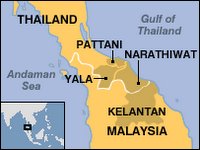
Perhaps in a spirit of good neighbor, Thailand has repatriated six Malaysian commandos who strayed into Thai territory.
Lieutenant General Ongkorn Thongprasom, commander of Thailand's Fourth Army Area Command, confirmed the repatriation took place on Tuesday after interrogations concluded the soldiers had become lost while patrolling the border separating the two neighbouring countries. They are definitely not spies," said Ongkorn. "If they were, they would not have worn uniforms. He said the six soldiers were low ranking army personnel who had limited knowledge of maps.
Thai police arrested the lost patrol on Monday in Sukirin district in Narathiwat, and sent them to the Fourth Army Command for investigation.
Thai Refugees Not Willing To Return Home.

Most of the 130 Thai Muslims who fled to Malaysia from a southern province last year were not willing to return home for the time being despite an assurance by the government to guarantee their safety. Thai Foreign Minister Kantathi Suphamongkhon said the Thai government respected their decision and would not force them to return.
In August 2005, they crossed the border into Kelantan and claimed their lives were in danger following the escalation of violence in the three southern provinces of Narathiwat, Pattani and Yala.
More than 1,000 people were killed since the outbreak of violence in January 2004 in the Muslim-majority south.
The refugee incident caused a diplomatic row between Malaysia and Thailand. One of the refugees, who were believed to be involved in the ongoing unrest, was handed over to the Thai authorities by Malaysia in December.
The United Nations High Commissioner for Refugees interviewed the refugees, who are currently being held in an immigration detention camp in Terengganu, but the UN body later left the matter to be resolved by both countries through negotiation. Malaysia also allowed Thai officials to interview the refugees and persuade them to return.
Wednesday, February 22, 2006
Malaysian PM Urges Australia To Promote Tolerance.
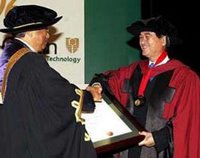
Malaysian Prime Minister Abdullah Ahmad Badawi urge Australia to take a lead role in promoting tolerance between religions. He was speaking at Curtin University in Perth, after being awarded an honorary doctorate of technology.
Pak Lah says Australia should use its diversity to improve the relationship between Christians and Muslims. He says he still considers Australia a tolerant nation, even in the light of December's Cronulla riots in Sydney.
"Even tolerant people have problems but the most important thing is how do you manage, how do you respond to such problems?" he said. "You must be able to deal with these destructive forces and deal on the principle, the basis that we opt for tolerance."
Nearly 100 Dead In US Custody.

Nearly 100 prisoners have died in US custody in Iraq and Afghanistan since August 2002, the Human Rights First organisation has said ahead of publication of a new report.
At least 98 deaths occurred, with at least 34 of them suspected or confirmed homicides - deliberate or reckless killing - the group of US lawyers said on Tuesday Feb 21, 2006. Their dossier claims that 11 more deaths are deemed suspicious and that between eight and 12 prisoners were tortured to death. However, charges are rare and sentences are light, the report said.
The report comes a week after new photographs of alleged prisoner abuse at Baghdad's notorious US-run Abu Ghraib prison emerged. The report alleged that one person was made to jump off a bridge into the Tigris River in Iraq and another was forced inside a sleeping bag and suffocated.
The number of deaths in custody discounts those due to fighting, mortar attacks or violence between detainees. They were directly attributable to their detention or interrogation in American custody.
Deborah Pearlstein said "We're extremely comfortable with the veracity and the reliability of the facts here. "These are documents based on army investigative reports, documents that we've obtained from the government or that have come out through freedom of information act requests in the United States" "These are documents based on army investigative reports, documents that we've obtained from the government or that have come out through freedom of information act requests in the United States."
Zalmay Khalilzad, the US ambassador to Iraq said "There are thousands of prisoners that have been held by the coalition during the past more than two years. "Some have died of natural causes and there have been charges of abuse. Of course, we always investigate and determine what happened and appropriate punishment is given if the judgment is made that illegal actions took place.
"If those reports are true, of course they would be terrible abuses and they would be illegal things. Those who are responsible for them would be investigated and they will be punished."
However, David Rivkin, a former White House legal adviser, said the numbers had to be put in perspective. "[If] 10 people were tortured to death out of over 100,000 detainees in Iraq and Afghanistan" that was "a better rate" than in both world wars and "most civilian penal systems". "It is not a scandal. Bad things happen in detention. A lot of them died for reasons that have nothing to do with it."
Amnesty International UK demanded an investigation into the deaths.
Congress at Odds With Israel, Bush Over Palestine Aid.
Arab News Says:
Since the US Congress passed a resolution to block any support to the Palestinians, non-governmental organizations in the US launched a campaign to prevent the cut in US humanitarian aid to the Palestinians. Rep. Ileana Ros-Lehtinen, the Florida Republican who chairs the House of Representatives’ Subcommittee on the Middle East is the author of the bill.
Leaders of the NGO are asked Secretary of State Condoleezza Rice, before she left to the Middle East, to maintain aid to organizations working in the territories for the benefit of the Palestinian people.
Ros-Lehtinen’s bill does not distinguish between the Palestinian Authority president and the Palestinian Authority Cabinet, in other words, between Abbas and members of Hamas. Nor does it include a waiver clause that would allow the president to bypass these restrictions in cases he sees as relating to the national interest.
President George W. Bush has used existing waivers in the current law to funnel financial aid directly to the Mahmoud Abbas-led PA.
The bill has gathered wide support in the House and is endorsed by Washington’s pro-Israeli lobby, the American Israel Public Affairs Committee. One source told Arab News: “Off the record? It was written by AIPAC.”
If these demands are not met, the bill calls for the Palestinian Authority to be slapped with sanctions, including restrictions on American exports, a ban on American visas for anyone affiliated with the P.A., and restrictions on the movement of officials representing the P.A. or the PLO in America.
Peter Gubser, President of the American Near East Refugee Aid agency, ANERA, an aid organization that helps people in the West Bank, Gaza Strip, Lebanon and Jordan, said: “The US should remain fully engaged with the Palestinian people. It is in our national interest to do so as we seek a solution to the Palestine-Israel conflict. And, as the welfare of the Palestinian people continues to decline, we have a powerful humanitarian reason to maintain America’s substantial assistance program in the West Bank and Gaza.”
The United Nations last year issued a report stating that Palestinians living in the occupied territories were facing a humanitarian catastrophe because of lack of food and the inability of the UN to travel freely within the territories and deliver food to families.
.
OIC Asks EU To Legislate To Protect Islam.
"We need the same protection from European law," the chief of the 57-nation Islamic body said while talking to reporters following a meeting with Pakistani Prime Minister Shaukat Aziz.
Right-wing historian David Irving was sentenced to three years in prison by an Austrian court on Monday on charges he had denied extermination of six millions Jews by the Nazis during World War II.
There "should be no double standards", he said, referring to the publication of cartoons of Prophet Mohammad (PBUH) in the European newspapers that triggered outrage and violent protests across the Muslim world.
Ihsanoglu said the Muslim community wanted European laws to protect their feelings and sensitivities so that freedom of expression was not abused for mud slinging on their faith and the Prophet.
Prime Minister Shaukat Aziz said after the meeting that he had formally requested the secretary-general to convene an extraordinary session of foreign ministers of OIC member states to evolve a common strategy to combat the defamation of Islam.
Shaukat Aziz said Pakistan would send a bipartisan parliamentary delegation to Brussels to meet members of the European parliament to mobilize support for appropriate legislation against attempts to ridicule religions and prophets. The delegation on its way back would stop at Jeddah to brief the OIC secretary-general about discussions in Brussels.
Grief:The Prophet's Guidance
Ibn Abbas reported that Prophet Muhammad used to supplicate in times of trouble saying:
"There is no god but Allah, the Great, the Tolerant, there is no god but Allah, the Lord of the Magnificent Throne; there is no god but Allah, the Lord of the heaven and the earth, the Lord of Edifying Throne.’
On the authority of at-Tarmizi, who reported that Prophet Muhammad used to supplicate saying:
"Allah, the Living, the Self-Subsisting and All-Sustaining, I implore Thy mercy." Whenever afflicted with a grief, the Holy Prophet raised his hands in supplication and said: "Holy is Allah, the Great," then he would go on saying ‘Allah, the Living, the Self-Subsisting and All-Sustaining."
Abu Dawud reported that Prophet Muhammad said to Abi Umamah:
"Shall I teach you words which if you recite; Allah will blot out your grief and relieve you of your debts?"
Abi Umamah said, "Oh, Yes!"
The Holy Prophet then went on saying :
‘All right, always remember to supplicate in the morning and evening with the following words':
"O Allah! I seek refuge with you from [worries] care and grief, from incapacity and laziness, from miserliness and cowardice, from being heavily in debt and from being overpowered by other men."
Abi Umamah said that he did so and Allah helped him overcome his grief and relieve him of his debt.
Ibn Abbas reported that the Holy Prophet said:
"Whosoever begs for Allah’s forgiveness, Allah will relieve him of his grief, give him a way out of his distress and provide for him from whence he expects not."
Another Prophetic saying as follows: "Seek strife in the cause of Allah, it is a gate conducive to the Garden and will verily ward off your cares and grief."
The Prophet also said:“When cares and grief haunt you, always recite, "There is no might and power but that of Allah."
Following are remedies which could to be resorted to when afflicted by grief and worries have started playing within one’s heart:
- Belief in One Lord.
- Belief that there is no god but Allah.
- Belief that Allah is Omniscient.
- Deanthropomorphism in understanding that Allah is not liable to wrong His servant, nor does He hold any responsible for anything he has no knowledge.
- The servant’s confession that he is the wrongdoer.
- Supplication, using the most sacred thing in the Divine perspective, namely His Names and Attributes and the most inclusive ones, in particular: He is the Living [al-Hayyu], the Self-Subsisting and All-Sustaining [al-Qayyum].
- Seeking refuge with Allah only.
- The servant’s recognition that only Allah is worth of making supplication
- Effecting complete dependence on Allah, resignation to Him and acknowledgement of the fact that one’s forelock is in Allah’s hand; He is decisive in His judgement and just in His decision.
- Complete absorption of the luminous words of the Holy Qur'an that can illuminate the dark areas of obscurities and lust.
- Seeking Allah’s forgiveness.
- Repentance.
- Fight in the way of Allah.
- Observance of prayer.
- Admitting incapacity, and conviction that there is no might and no power but that of Allah.
Bush Threatens Veto In Ports Row.
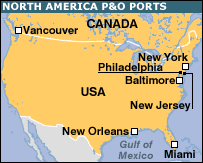
According to BBC, US, President George W Bush says he will veto any law blocking a deal giving an Arab company control of six US ports.
The threat came as Bill Frist, leader of the Republican Party in the Senate, said he would move a blocking law if the government did not delay the deal.
The issue has developed into a very serious political standoff between Bush and senior Republicans.
Administration officials will address an unusual session of the Senate Armed Services Committee on Wednesday the planned takeover, which would put six of the largest ports in the hands of Dubai Ports World of the United Arab Emirates.
The ports are New York, New Jersey, Philadelphia, Baltimore, New Orleans and Miami.
Critics say this would make the US more vulnerable to terrorism.
The ports are currently run by British ports and shipping firm P&O, which has agreed a $6.8bn takeover by DP World
Setting the Scene for an Eventful Story.
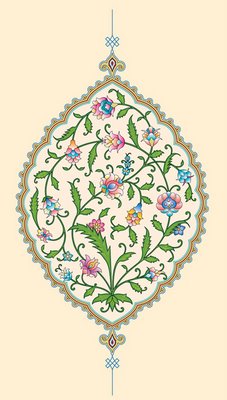
A commentary by Sayyid Qutb
In the Name of God, the Merciful, the Beneficent
[i.] Ta Sin Mim.
[ii.] These are verses of the Book that makes things clear.
[iii.] We shall relate to you some of the story of Moses and Pharaoh, setting forth the truth for people who will believe.
[iv.] Pharaoh exalted himself in the land and divided its people into castes. One group of them he persecuted, slaying their sons and keeping their women alive. He was one who sows corruption.
[v.] And We wished to do a favour to those who were weak [and oppressed] in the land, and to make them rulers and to make them the inheritors .
[vi.] And to establish them in the land, and We let Pharaoh and Haman and their hosts receive from them that which they feared.
[The Story, Al-Qasas: 28: 1-6]
Ta Sin Mim. These are verses of the Book that makes things clear.” [Verses 1-2] The surah begins with these three separate letters to make clear that it is from letters like these that the Qur’an is composed. Its verses are of greatly superior quality and of much finer import than what is normally composed by such letters in human language: “These are verses of the Book that makes things clear.” [Verse 2] Thus, this book is not the work of ordinary people; for no one can produce its like. It is revelation God relates to His servants, reflecting His incomparable ability, and the truth that is at the heart of everything God makes, large or small: “We shall relate to you some of the story of Moses and Pharaoh, setting forth the truth for people who will believe.” [Verse 3] It is then to the believers that this book is addressed. It is meant to remold and cultivate them, pointing out their way and showing them the code to implement. The stories related in this surah are meant for those believers, because they are the ones who will benefit by them.
This direct relation from God imparts an air of the special care taken of the believers, giving them a feeling of their high position and great importance. How could they fail to realize that, when it is God Almighty that relates His book to His Messenger for their sake. Being believers, they have the quality that fits them to receive such sublime care: “For people who will believe.” [Verse 3]
Having made this opening, the surah begins the story of Moses and Pharaoh, right from its very first moment, when Moses was born. Although Moses’ story is related in many other surahs, it is never started at the very beginning anywhere else. It is this very beginning, describing the difficult circumstances in which Moses was born, powerless among people who have been long persecuted and humiliated by Pharaoh that serves the main theme of the surah. It shows the hand of the divine will working openly, without any apparent human medium, to directly strike at the root of tyranny and injustice. It thus gives support and empowerment to the oppressed that have been deprived of all power. This is a concept that the small and weak Muslim minority in Makkah needed to fully understand. It was equally important that the powerful majority should be well aware of it.
In the majority of cases, Moses’ story begins in other surahs at the time when he received his message, giving an account of how strong faith stands up to tyrannical power, leading eventually to the triumph of faith and the defeat of tyranny. However, this is not the message this surah intends to give. Its message is that when evil is at its zenith, it carries the cause of its own destruction, and when aggression is let loose, it does not need people to fight and repel it. God will intervene to support those powerless people that are made to suffer at its hands. He will then save the good elements among them, educating them and making them leaders of humankind and inheritors of the earth.
Such is the purpose of relating this story in this surah. Hence, it begins with the episode that highlights this meaning. Every story related in the Qur’an is told in the way that best serves the purpose of the surah in which it occurs. It is a means to educate people and to emphasize concepts, values and meanings. Hence, it is made to smoothly fit in with the context in which it occurs.
The episodes of Moses’ story that are told here are those of his birth in exceptionally difficult circumstances and how God took care of him; his youth and the wisdom and knowledge God imparted to him; the events that took place at the time and how he killed an Egyptian, his flight from Egypt after learning of what was being plotted against him, his marriage in the land of Madyan and the time he spent there; his being called by God and given his message; the confrontation with Pharaoh and his people and how they rejected both Moses and Aaron; and finally a quick reference to Pharaoh’s meeting his end by drowning.
The first two episodes, which are mentioned only in this surah, are treated at length because they bring to the fore the open challenge to aggressive tyranny. We clearly see how Pharaoh is unable to evade God’s will despite all his precautions and maneuvers: “But it was Our will... to let Pharaoh, Haman and their hosts experience at their [i.e. the oppressed] hands the very things against which they were taking precautions.” [Verse 6]
Following the Qur’anic method, the story is actually shown in a series of scenes with some gaps in between that are left to our imagination. In fact, the reader does not miss anything of the events and images that are left out between scenes. On the contrary, we actually enjoy the active participation of our imagination. The first episode is recounted in five scenes, while the second takes up nine scenes, followed by four scenes in the third episode. In between each two episodes, there is a wide or narrow gap, as is between scenes, allowing the curtains to drop and be lifted again.
Tuesday, February 21, 2006
Diplomat's Son Was Charged For Offending Thai Royalty.
"We Thais have deep respect for the royal family," Thailand's ambassador to Norway, Chitriya Pinthong, told newspaper VG on Tuesday Feb 21, 2006. The ambassador noted the Thai penal code that regulates the prohibition against making derogatory remarks about Thailand's head of state or members of the royal family.
Thailand's ambassador declined to comment further on the case, because it is now under the jurisdiction of the Thai court system. A spokesperson for the Norwegian Foreign Ministry was also reluctant to speak about the case, saying it was "a consular matter, on which we don't want to comment."
Norway's embassy in Bangkok confirmed that it had been involved in the case, but would not offer details. Arne Lundby of the embassy told VG "in Thailand, you're breaking the law if you speak negatively about, or in another way offend, members of the royal family." VG reported that the alleged offense, according to Thai authorities, occurred at a gathering in Thailand last spring, at which both the diplomat's son and a Thai princess were present. The nature of the offense was not revealed.
The Norwegian was charged in 2005 and taken into custody, but he was released from jail after posting bail. He no longer has a diplomatic passport and his travel documents have been seized, as he has been prohibited from leaving the country while his court case is pending.
His diplomat father was not identified, but he reportedly is not attached to the Norwegian embassy in Bangkok.
Police Detain Malaysian Commandos.
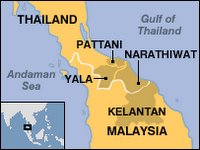
According to The Nation Tuesday Feb 21, 2006:
Narathiwat police have detained six armed Malaysian commandos were found straying about five kilometers from the border in Narathiwat province on Monday.
Thai police were alert by local villagers in Sungai Padi district about the presence of the commandos-clad men armed with rifles and machine guns.
Confiscated from them were six rifles, machine guns and rounds of ammunitions. A police source quoted one of the men as saying that they just got lost and had no intention to invade into the Thai soil.
Investigation into the real intention of the invasion has continued until today.
The Nation also said that this is not the first time that the Malaysian soldiers were found in the Thai soil.
Australian PM Denounces Muslim Attitudes.
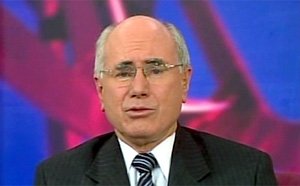
In another strategic initiatives, the Australian Prime Minister John Howard said some segments of the country's Islamic community were "utterly antagonistic" to Australian society in comments, published Monday 20,2006 that immediately drew criticism from a Muslim group.
Howard also denounced "extreme attitudes" held by some Muslims, including their views on women and support of jihad, or holy war. He said some Muslim immigrants had not integrated into Australian society as well as previous waves of Europeans and Asians.
"There is a fragment [of the Islamic community] which is utterly antagonistic to our kind of society, and that is a difficulty," Howard said.
"There is no equivalent of raving on about jihad ... that is the major problem," he added. "I think some of the associated attitudes towards women [are also] a problem."
Howard's comments were from an interview conducted in December 2005 for a book marking his 10th anniversary as prime minister. They were published for the first time Monday in The Australian newspaper.
Hamas Presents PM Choice to Abbas.
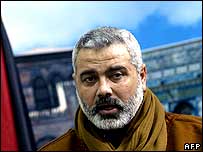
Hamas have officially presented Ismail Haniya as their choice for prime minister during talks in Gaza with Palestinian President Mahmoud Abbas. Abbas was to ask Haniya on Tuesday 21,2006 to start the formation of the government.
Hamas says it wants a coalition, and senior Hamas leader Mahmoud Zahhar has been meeting faction leaders to enlist their support.
Mr. Abbas' Fatah party has refused to join, as has militant Islamic Jihad.
Israel has announced a range of punitive measures against a Hamas-dominated Palestinian Authority. Israel backed by the United States and the European Union consider Hamas a terrorist organisation because of its past suicide bombings against Israeli targets. Hamas calls the attacks legitimate resistance.
The UN envoy to the Middle East raised objections to Israel's move to withhold tax and customs duties, which are paid monthly to the cash-strapped Palestinian Authority.
Haniya has dismissed the effect of Israeli financial restrictions on the PA. He said that Arab and Islamic states would offset a drop in Western aid and said Hamas would not disarm or recognise Israel. Egypt's Muslim Brotherhood has announced an international fund-raising campaign and Iran has called for pan-Islamic support.
Hamas controls 74 of 132 parliaments seats and could govern alone - even though nine of its candidates are currently held in Israeli jails.
Hamas leaders have said they want to form a coalition that would include Abbas's Fatah Party. Mahmoud Zahhar met representatives of other factions in Gaza and said the group expected to form a government in the next two weeks. "We are optimistic about establishing a national unity government that can represent a national attitude,” Zahhar said. However, Fatah officials say they will remain in opposition, as have members of the Islamic Jihad militant group, which like Hamas does not recognise Israel's legitimacy.
The Popular Front for the Liberation of Palestine [PLFP] says it has agreed in principle to join a Hamas-led government.
Israel's acting Prime Minister Ehud Olmert has said Israel would "not hold contacts with the administration in which Hamas plays any part - small, large or permanent".
The head of Israel's Shin Bet security service, Yuval Diskin, told Israeli parliamentarians that a Hamas-led Palestinian Authority posed a serious danger to Israel. "A Hamas state on the borders of Israel is a real threat. This will be a radical Sunni state that radical forces can reach from around the world," Diskin told the parliament's foreign affairs and defence committee. "Therefore a Hamas state … with military and terror capabilities is a strategic threat to Israel."
Monday, February 20, 2006
OIC Mulls Extending Aid to Sanction-Gripped Palestine

Datuk Seri Abdullah Ahmad Badawi said the Organisation of the Islamic Conference [OIC] is considering extending financial aid to Palestine that faces the prospect of a financial squeeze following Hamas' recent victory in parliamentary elections.
"I have already spoken to some leaders about it. We want to help the Palestinians," said the Malaysian Premier who is also the OIC chairman.
In an interview with the Associated Press, Abdullah urged those who had helped the Palestinian people before this to continue doing so, notwithstanding the leadership change in their country.
Israel stopped the payment of about $50 million a month in tax money to the Palestinian Authority [PA], collected on behalf of the Palestinians. The Americans too had asked for the return of some US$50 million in aid meant for infrastructure projects in Gaza, as it did not want the money to be used by a Hamas-led government.
Commenting on Hamas Abdullah said the Palestinians had their own reasons in voting for a Hamas-led government. He said he believed that Hamas could be a responsible government, which would not like to see the Palestinian people living in fear of continuing violence. He added that Hamas had been doing a lot of social service and the Palestinian people recognised this.
Asked whether he would try to persuade Hamas to live in peaceful co-existence with the state of Israel, Abdullah said: "Well, I have written to them asking them to take advantage of this [the situation] and also to pursue the peace process." The prime minister said he believed that they would see the merit in the suggestions put forward to them.
Hamas has reportedly refused to renounce violence and the right of Israel to exist.
Abdullah said that all Palestinians aspired for peace as they had endured sufferings for too long. "Give them a chance to live in peace and when they are peaceful, they will know how to live in peace with others too," he said.
The interview also touched on Muslim furor surrounding the publications of insulting caricatures of Prophet Muhammad in mostly European newspapers. Abdullah said that Muslims were unhappy with what was happening to their fellow brothers and sisters in Iraq and Palestine, and this feeling was intensified with the reproductions of the cartoons, which were seen as an act of provocation.
Although the incident had created a lot of mistrust, he believed that the damage was not irrevocable. “It must not allow us to believe that nothing can be done to create a situation where feelings and relationships can be improved," he said.
Abdullah said what was needed was for both sides of the divide to create a new sense of mutual confidence and respect.
Islam Strictly Prohibits Zina.
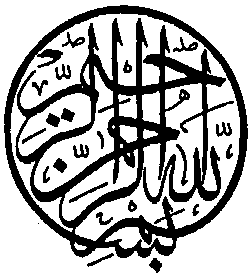 Islam strictly prohibits Zina and blocks all doors that may lead to it. In this context, the Prophet Mohammad, peace and blessings are upon him, considered:
Islam strictly prohibits Zina and blocks all doors that may lead to it. In this context, the Prophet Mohammad, peace and blessings are upon him, considered:Hungry and lustful looks at a person of the opposite sex as "the Zina of the eye," according to his saying, "The eyes also commit Zina, and their Zina is the lustful look." [Reported by Al-Bukhari]
He termed the lustful look Zina because it gives sexual pleasure and gratification in an unlawful way. Indeed, such hungry and lustful looks are not merely a danger to chastity but they also result in agitation of the mind and disturbed thoughts.
This is also what Jesus, peace and blessings are upon him, said in the Gospel of Matthew: “You have heard that it was said, 'You shall not commit adultery'. But I say to you that everyone who so much as looks at woman with evil desire for her has already committed adultery with her in his heart.” [Matt. 5: 2728]
Sheikh Yusuf Al-Qaradawi, states:
“It is not surprising that all the revealed religions have prohibited fornication and adultery [Zina] and have fought against these crimes against society. Islam, the last of the divinely revealed religions, is very strict in prohibiting Zina, for it leads to confusion of lineage, child abuse, the breaking-up of families, bitterness in relationships, the spread of venereal diseases, and a general laxity in morals; moreover, it opens the door to a flood of lusts and self-gratification.
Islam has taken a firm and decisive stance against fornication or adultery [Zina]. Allah in explicit and unequivocal words, commands us:
And come not near unto adultery. Lo! It is an abomination and an evil way. [Al-Israa’: 32]
Islam not only prohibits Zina, but also closes all the avenues and means leading to it. This is achieve by prohibiting every step and means leading to stimulating desires, opening ways for illicit sexual relations between men and women, and promoting indecency and obscenity.
Sheikh Sayyed Sabiq in his book Fiqh As-Sunnah, stated:
“Any illegal sexual intercourse between a man and a woman is subject to a severe punishment prescribed by the Shari’ah. The Fuqahaa’ [Muslim jurists] have unanimously agreed that Zina is constituted by the penetration of the penis into a ‘forbidden’ vagina, deliberately [i.e. not being forced to], and with no doubt of marriage i.e. marriage that is deemed invalid but the couple do not know, even if there is no ejaculation”.
As for other sexual acts of foreplay, which do not result in intercourse, there is no Hadd [prescribed punishment] for it as in the case of Zina. However, the Muslim ruler or judge has the right to give Ta’zeer [disciplinary punishment] for those who indulge in those forbidden activities.
Those acts are not subject to the punishment of Zina.
A Hadith reported by Ibn Mas’ood, which stated:
A man came to the Prophet Muhammad, pbuh, and said: “O Messenger of Allah, I sported with a woman in the outskirts of Madina . . . [and] committed an offence, short of fornication. . . kindly deliver verdict on me.
[i.] Saidina `Umar, who was present, said to him: “Allah concealed your fault. You had better conceal it yourself also.”
[ii.] The Prophet Muhammad, pbuh, gave no reply to him, so the man stood up and went away. Thereupon the Prophet, pbuh, sent a person after him to call on him and recite to him: “And keep up prayer in the two parts of the day and in the first hours of the night; surely good deeds take away evil deeds this is a reminder to the mindful.” [Hud 11:115] Following this, the Prophet, pbuh, dismissed the man, telling him: “Allah has exempted you from the imposition of Hadd, or from your sin.”
[iii.] Someone present at the time asked the Prophet, pbuh, whether such clemency related only to that individual. “No, but for the people at large,” the Prophet, peace and blessings be upon him, said reassuring all believers.”
[Muslim, At-Tarmidzi and Abu Dawood.]
This does not mean that other behaviors such as kissing, hugging, caressing, heavy petting, etc are not major Zina, but they fit into the category of minor Zina, which also is prohibited. Obviously, couples can engage in all these activities without exposed to witnesses and thus avoid punishment in this life. Nevertheless, they still must answer to Allah, the Almighty, who, clearly, admonishes against any sexual contact outside of marriage.
Masturbation is Haram [forbidden] though it is not subject to the same punishment of Zina, 100 lashes for unmarried person; stoning to death to the married one. A person who indulges in these activities should make sincere repentance to Allah by giving up this sin, feeling regretful for what he has done and ask Allah to forgive him.
May Allah protect us from this evil act and guide us on the right path always.
Moorthy’s Mother Visits Grave.

R. Saraswathi, 62, was accompanied by her daughter Tenmuli, 47, son Sanggarlingam, 26, and niece S. Meenambal, 20. They scattered flower petals and sprinkled rose water on the grave, and expressed relief on finally seeing the resting place of the Everest climber, almost two months after the burial.
"I feel sad, but there is nothing else to be done. Since he was a Muslim, then this is where he should be buried," said Saraswathi, adding that she only wished Moorthy had informed the family about his conversion.
"My other son is also a Muslim. Years ago, he told us about his wish to marry a Muslim girl and conversion. In fact, I was the one who made the wedding preparations.
"However, when Moorthy died, none of his family knew about his conversion."
She hoped that those who had converted would inform their families.
Sanggarlingam said that the family had come to terms with the situation. "For us, it is no longer an issue. We accept what has happened. Now we are happy that we can come here to visit his grave at least once a month."
Thai Prime Minister Threatens Snap Election.
Government spokesperson Surapong Suebwonglee told Channel 3 television Thaksin would not yield to mounting calls to quit and had told a Sunday cabinet meeting that dissolving parliament could be the way out of the political crisis. "The prime minister said he would certainly not resign. But if he was put into a situation that he had to make any decision, he would dissolve parliament," Surapong said.
Iran, Russia In Talks Over Nuclear Deal.
 Iranian and Russian officials are meeting in Moscow to discuss a compromise deal that may be the last chance to defuse the row over Tehran's nuclear programme.
Iranian and Russian officials are meeting in Moscow to discuss a compromise deal that may be the last chance to defuse the row over Tehran's nuclear programme.Moscow is offering to enrich the uranium Iran needs for nuclear power stations on Russian soil, an arrangement that would help ease international concerns Tehran could divert the material for bomb-making. The Russian offer, backed by the United States and Europe, represents a last-minute chance for Iran to address concerns before a March 6, 2006 meeting of the International Atomic Energy Agency [IAEA], which could start a process leading to punishment.
The arrival of the Iranians was kept low-key, with no Russian officials turning up at Moscow's Sheremetyevo airport to meet the delegation, led by Ali Hosseinitash, a deputy head of the Supreme National Security Council. Members of the delegation declined to comment on the format or contents of their planned talks with counterparts from Russia's Security Council and its nuclear agency Rosatom.
Rose Gottemoeller, the director of the Carnegie Moscow Centre, said: "At the moment there's only one diplomatic door left open and it’s open a crack.” So I think this set of talks on Monday Feb 20, 2006 is very important for the future of the diplomatic approach."
However, privately Western diplomats are skeptical Tehran will accept the proposal. Iran says it has a sovereign right to carry out a full nuclear fuel cycle on its own soil, but is willing to hear more about the Russian plan. Western diplomats say they believe Tehran is keeping the Russian offer on the table to buy time.
"It's just window-dressing. We don't see the Iranians as serious about the proposal," one EU diplomat, who requested anonymity, told Reuters.
European officials will also make a fresh appeal to Iran to halt sensitive nuclear activities when Manouchehr Mottaki, the Iranian Foreign Minister, visits Brussels on Monday.
Mottaki told reporters at Tehran's Mehrabad airport on Sunday that he was optimistic about the talks. "We are ready to hear any new plan ... provided Iran's right to uranium enrichment is preserved," he said.
Countries on the board of the IAEA, have called for the Iranian controversy to be referred to the UN Security Council by March 6. The Security Council, where Russia has a veto, has the power to impose sanctions.
Israel Imposes Sanctions on PA.
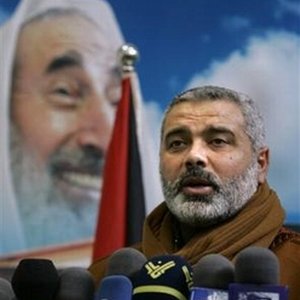
Israel has imposed restrictions on the Palestinian Authority in an apparent move after Hamas's election victory. The security checks would be stepped up at crossing points between Israel and Gaza and the movement of Hamas members restricted in West Bank territory under Israel's control. Israel will call international donors not to transfer funds to the Palestinian Authority once Hamas forms a government, but will allow money in for humanitarian purposes.
Nabil Abu Rudainah, a spokesman for Mahmoud Abbas, the Palestinian president, called the Israeli measures harmful.
But Israeli government source said: "We did not want to make it too hard for the Palestinians or take steps now that would prevent us from taking harsher measures later. "We also took international pressure into consideration. We want to maintain international sympathy for Israel's position."
Israel will halt the payment of customs duties it collects on behalf of the Palestinian Authority, worth about $50 million a month. Almost all Palestinian exports from Gaza must pass through Israeli crossings.
Nayef Rajoub, a prominent Hamas leader who is likely to assume a ministerial portfolio in the new government, accused Israel of carrying out a "silent genocide against millions of men, women and children" in the occupied Palestinian territories. Rajoub described decisions by the Israeli government to stop transferring Palestinian tax returns to the PA as "theft in broad daylight".
"Israel will bear the full responsibility for this legal and moral crime against the Palestinian people," he said.
Onn Sunday, Ehud Olmert, the acting Israeli prime minister, ruled out all contacts with the new Hamas-led Palestinian legislature. Olmert made the comments to the Israeli cabinet, which met a day after the new Hamas-dominated Palestinian legislature was sworn into office.
Olmert asked the cabinet to consider a series of economic sanctions against the Palestinians. The measures were meant to crush the already battered economy of the Gaza Strip in response to Hamas's electoral victory.
He said that the moment Hamas enters parliament, relations with the Palestinians will be affected. However, Olmert said Israel would allow humanitarian aid to reach the Palestinians. "Given the Hamas majority in parliament ... the Palestinian Authority becomes, in effect, a terror authority, Israel won't agree to that."
Olmert said Israel "won't compromise with terror" and ruled out any contacts with a government in which Hamas participates. "On the other hand, we have no intention of hurting the humanitarian needs of the Palestinian people,”
Saturday, February 18, 2006
Mustapha Vows To Realize Human Capital Development.
Describing the vision, as among the challenges he would face in his new portfolio, Mustapha said it would be fulfilled through the 18 public tertiary learning institutions and 26 university-status private institutions of higher learning, which have more than 750,000 students, and more than 500 private colleges.
He said his new job was very different from the duties he had performed in his 30 years service as a civil servant and a politician which were all related to economics and finance.
Mustapa said he was prepared to face the challenges in the new field to honour the aspirations of Prime Minister Datuk Seri Abdullah Ahmad Badawi and Malaysians.
Pak Lah appointed a right person at the right place. In the 21st century, Malaysia need to produce global graduates’ quality enables to compete in not only Malaysia but also globally.Our higher learning institutions must quickly transformed into the equivalent world’s centres of learning with major disciplines made available and sought after. Tok Pa must turn Malaysia as a centre of learning.
MNLF Re-Elects Misuari as Chairman
"Nur Misuari is indispensable in the search for peace in Mindanao and it is also the clamour of the Muslim people that he leads the MNLF again," said Muslimen Sema, the secretary general of the MNLF and the mayor of Cotabato City.
Efforts are now underway to reorganise the MNLF, said Sema, adding the MNLF Central Committee agreed to dissolve the Council of 15 and for Misuari to take over again and work for the unification of tens of thousands of members across the southern Philippines.
The MNLF would also consult with the influential Organisation of Islamic Conference [OIC] in which the MNLF has a permanent observer status, said Sema.
"The first thing we will do now is to put the MNLF as one organisation and ... get our acts together and search for peace," he said.
The decision to bring back Misuari was the result of a series of meetings and consultation since 2004.
Friday, February 17, 2006
Bomb In Thailand's Restive South Injures 13, Including 11 Police.

AP via The Star: Eleven policemen and two villagers were injured by a bomb Friday Feb 17 in southern Thailand.
The bombing in Narathiwat appeared to be the latest violence in the country's Muslim-dominated southernmost provinces that has led to about 1,300 deaths in the last two years.
The 5-kilogram [11-pound] bomb, hidden in a fertilizer sack by the side of a road, exploded as police were investigating the shooting of a villager, said police Sub. Lt. Sonphet Tanthi-amonkun.
The victims, including two civilian passers-by on a motorcycle, suffered mild injuries.
Hamas Makes First Parliamentary Appointments.
Hamas made its first parliamentary appointments on Wednesday Feb 15, 2006 as Israel prepared to decide on its strategy toward the Palestinians after the Islamic militant group takes up the reins of power. It named Mahmoud al-Zahar from Gaza, one of its most hardliner leaders, as head of the Hamas majority faction in the legislature, which convenes on Saturday Feb 18, 2006 for its first session since the group won the Jan 25 Palestinian election.
Hamas chose Aziz Dweik, from the West Bank, as parliamentary speaker. As the leader of parliament, Dweik would become interim president, pending an election within 60 days, in the event of the death, resignation or incapacitation of President Mahmoud Abbas of the Fatah faction.
The appointments raised speculation that Hamas would choose another of its leaders, Ismail Haniyeh, as prime minister. A Gazan, he is viewed by Palestinians as a pragmatist who has forged good relations with rival factions.
Hamas officials have said they expect the group to announce it choice for the post as early as Saturday or Sunday, after parliament convenes and before Israel holds its own election on March 28.
With the clock ticking toward formation of a Palestinian government, Israeli Foreign Minister Tzipi Livni summoned advisers for consultations, that one official said would focus on "funding for the Palestinian Authority in the Hamas era".
Israeli officials have said Israel is trying to persuade donor nations to cut off support for the Palestinian Authority once a parliament dominated by Hamas is sworn in. Hamas's charter calls for Israel's destruction.
The United States and Israel hope to isolate a Palestinian government headed by Hamas financially and diplomatically to pressure it to renounce violence, recognize the Jewish state and honor interim peace agreements, the Israeli officials said.
Palestinians receive about $1 billion a year from all donors and the Palestinian Authority requires at least $100 million a month. Palestinian officials have said they expect Saudi Arabia, UAE and other Arab states to boost the amount of support they provide to the authority in the coming months.
Israeli Defense Minister Shaul Mofaz planned to convene his advisers on Thursday to discuss security policy toward the Palestinians with Hamas in the government.Hamas has masterminded nearly 60 suicide bombings against Israelis since a Palestinian uprising began in 2000, but has largely adhered to a truce declared last March.
Israeli security sources said proposals could include a tightening of travel restrictions for Palestinians in the occupied West Bank, where Israel is building a barrier it says is vital to its security and the World Court has deemed illegal.
It shows US and Israel are nothing more than unsecured misled associates, war mongers and the mordern Pharoah in actions.
Bush Plans Huge Propaganda Campaign In Iran
Despite the heated situation in Iraq, persistent violence, surge in attacks, and daily bloodsheds, Iraq is no longer the mainstream news. Iran has become a new focus of distorted Western propaganda, with the biased U.S. now shifted to demonizing the Islamic Republic.
Nearly three years ago, the Iraqi capital Baghdad fell to U.S. ground forces as they spread out across Iraq under the guise of protecting “freedoms and democracy”. Today, with more than 140,000 U.S. troops on the ground, thousands of Iraqi civilians killed, the country’s infrastructure devastated and noticeable rise in bloodshed and violent attacks, as well as heated sectarian tension that threatens the country’s security. The situation in Iraq is bleak which need attention.
Many anti-Iraq war movements’ peace activists and important personalities opposed the invasion of Iraq; spoke positively about the need for a real change in the U.S. foreign policy to end the carnage that has plagued Iraq and the Middle East region at large.
Nevertheless, so far no action has been taken, and the U.S. government, lead by President George W. Bush refuses to heed lessons from the quagmire in Iraq and mistakes that has drowned the U.S. in a situation that needs ages to change. Body bags continue to come home and Iraqi civilians continue to pay the price for a crime committed by the U.S. and its war allies.
Lately Washington started to move the conflict to Iran. Fueling the international controversy created over Iran’s nuclear program. The U.S. managed to get the UN atomic watchdog, the International Atomic Energy Agency [IAEA] refer Iran’s nuclear dossier to the UNSC for possible sanctions, creating a situation that recalls steps taken against Iraq before the war was launched on March 20 2003.
The IAEA decided to send Iran to the UN Security Council over its decision to resume suspended research on uranium enrichment.
However, the Islamic Republic insists that its research is solely aimed at energy production while Western powers claim that the Islamic Republic is secretly working on an atomic weapons program.
The U.S. Secretary of State Condoleezza Rice said that Bush’s admin plans to submit a request to the Congress for another $75 million to fund around-the-clock radio and television broadcasting into Iran and other activities to boost reform efforts.
It seems that the U.S. is moving for a more serious war in Iran, war of influencing people’s thoughts and minds
The Secretary of State is set to hold talks in the Gulf next week, with Iran on top of her agenda. According to a State Department official, Rice will visit key U.S. allies in the region like Saudi Arabia and Egypt
.
There is no question Washington needs Iran in Iraq. Iran influence in Iraq can turn the U.S. position in Iraq 180 degrees.
Speaking lately to the Senate Foreign Relations Committee, Rice renewed the U.S. accusations against Iran. "The Iranian regime is a strategic challenge to the United States, to the world, and a destabilizing influence in the Middle East.” The United States will actively confront the aggressive policies of the Iranian regime".
"At the same time, we will work to support the aspirations of the Iranian people for freedom and democracy in their country.”The international community is going to have act and act decisively if Iran is to know that there is a consequence for their open defiance of the international community, so we are working on precisely that".
The recent U.S. efforts, pushing for this campaign, are actually part of a bigger and wider campaign to increase pressure on Iran, as the showdown over its nuclear activities headed to the UN Security Council.
Tehran and Washington used to have close ties. Iran was a major U.S.-Israel ally during the dictatorship rule of the Shah, who was the U.S. gendarme to police the Gulf States and promote U.S.-Israel interests.
But today’s conflict with Iran, the only independent nation left after Iraq, over the nuclear “threat”, is nothing more and nothing less than the usual threat the U.S. and its allies use to intimidate nations with independent governments
Unlike what happened in Iraq, the U.S. failed to get an evidence to prove that Iran runs nuclear weapons program.
Iran, a signatory to the Nuclear Non-Proliferation Treaty has the right to pursue peaceful nuclear technology – in medicine and in energy – program and whatever field it needs as long as it does not pose global threat.
Analysts also view Washington’s Iranian nuclear “threat” claim as a smokescreen used to divert the world, the U.S. and UK’s angry public attention from the U.S.-Britain criminal atrocity in Iraq.
